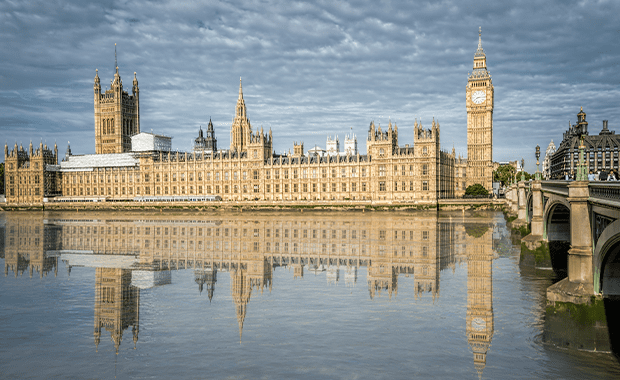At the start of 2022, we asked our GK Team to give us an insight into how they think the next 5-years will pan out.
Milo:
Wes Streeting leader of the Labour Party in a formal coalition government with the Liberal Democrats after a general election in Spring 2024, with a re-strengthened ‘red wall’ and the informal support of the Scottish Nationalists on the condition of an independence referendum – which will be lost by the Nationalists. Northern Ireland to remain part of the United Kingdom despite Sinn Fein winning Irish elections in 2025.
Joe:
In 2027 we’ll have a minority Labour Government or Progressive Coalition elected on a mandate to fix public services, improve creaking infrastructure, and restore financial security for millions of people.
In healthcare, new Integrated Care Systems and Partnerships will have improved link between different parts of the NHS and a greater emphasis will be placed on holistic care. Workforce recruitment and retention will finally have turned the corner, but a solution for a more equitably funded social care system will still be missing.
Iain:
I think we’ll be in another period of coalition government in five years’ time as, on current form, there will be no outright winner of the next general election. If so, it’s likely to be a period (as with the previous coalition) in which potential constitutional changes loom large.
In terms of policy issues, I think there will be real frustration (which could, alas, lead to some political polarisation) that:
- we didn’t do more to prevent global warming as, in five years’ time, I think its seriousness and effects will finally be evident to everyone
- the UK’s national debt had been allowed to soar, over the previous 20 years, to levels which will make it much harder to fund key public services – due to debt servicing costs.
Positively, the widespread introduction of driverless cars will be looming, which could transform the quality of life of millions of Britons – especially the elderly.
Finally, there will be a national (well, English) feelgood factor as Jurgen Klopp becomes the England football manager – leading to the team actually winning something, at last, and assured ‘national treasure’ status for the man himself!
Will:
Boris Johnson will lead the Conservatives into the General Election to be held in May 2024, resulting in a hung Parliament and Labour narrowly the largest party in the House of Commons. Johnson largely recovers his own personal position during the remainder of this Parliament, but recent sex scandals among his MPs prove to be the tip of the iceberg, with further and more serious revelations destroying any hopes for the Conservatives remaining in Government. Johnson will be the last Conservative Prime Minister for a generation, as the minority Labour Government introduces electoral reform as the price for Liberal Democrat support, ultimately leading to a splintering on the right of British politics.
The union of the United Kingdom will continue to come under significant pressure during the course of the next five years, but Northern Ireland – not Scotland – will be the first to break away from the UK. Despite this, Brexit more generally will come to be viewed as an economic success, with at least one other EU member state holding a referendum on EU membership within the next 5 years.
Sam:
By 2027, I expect the Labour Party to have built substantial political momentum and to have eroded the Conservatives’ majority in Westminster, formulating a progressive coalition on a mandate of investment in green infrastructure and renewables, modernising and investing in the NHS, and developing an education system that puts the needs of children at the centre. As part of this, I expect the devolution agenda to have been given more substance, which will see lessons learned from Welsh Labour, and more powerful combined authorities across the UK begin to emerge, allowing powers for education, health and care, and planning decisions to be taken into the hands of local people in pursuit of levelling up the UK.
Louise:
Post a general election with no landslide victories – new leadership across both parties. And a women heading up the Labour Party
At least 5 departmental rebrands ….
GK will be staffed by some of the great interns from I Have a Voice making our business more diverse
PE investing in emerging regulatory deals – and GK advising on the political, policy and regulatory aspects of fintech, greentech and more.
Reconsideration of our role in Europe – still out but with closer working
Lavinia:
In five years, there will be the bittersweet realisation that leaving the EU brought more regulatory headaches than benefits. While returning to the EU will be still a question mark, the five-year from now government hopefully will understand the importance of maintaining close relationship with countries near the UK
Dani:
In 2027, the majority Labour Government attempts to further foster the UK’s relationship with the EU to counter the variegated complexities in international relations caused by Russia’s and China’s expansionalism and military threats. In addition with the reality of climate change and a persistent global food crisis, the UK Government and it’s people, who are enjoying a period of economic boom following a recession which decimated the Conservative party, vow to tackle both. Working with western nations who so far have prioritised domestic inward investment, innovative and renewable businesses will be given the platform to invent, change and benefit society as a whole.
Scott:
After the next General Election, the Conservative Party will be the largest party but fall short of an overall majority. They will form a government with the support of the DUP, who in Northern Ireland will face the prospect of a united Ireland, largely caused by years of frustration over the EU border and changing attitudes towards links to Great Britain.
The Conservative Party will, however, be led into the next General Election by a different leader, Johnson’s resignation will allow for the fourth renewal of the party in 15 years. The Labour Party will make gains but fail again to reconnect with its former heartlands in Scotland and the North of England. Labour, Liberal Democrats and Green Party will all face a period of introspection as they rethink their proposition to the country.
English nationalism will continue to threaten all the main parties. Scotland has voted for independence, via a referendum granted by Holyrood not Westminster, leading to protracted legal challenge in the Supreme Court frustrating the will of the Scottish people.
Robin:
Another coalition government, this time led by a woman.
Scotland devolved even more powers and autonomy to ward off independence.
Gk to be operating across the globe.
Pension age raised to 72.
England win the world Cup with Sir Alex Ferguson coming out of retirement and managing England to victory.
Sam:
By 2027, I expect the Labour Party to have eroded the Conservatives’ majority in Westminster, formulating a progressive coalition on a mandate of investment in green infrastructure and renewables, modernising and investing in the NHS, and developing an education system that puts the needs of children at the centre. As part of this, I expect the devolution agenda to be given more substance, which will see lessons learned from Welsh Labour, and more powerful combined authorities across the UK begin to emerge, allowing powers for education, health and care, and planning decisions to be taken into the hands of local people in pursuit of levelling up the UK.
Natasha:
In the short term, price rises will eventually subside and supply chains will be strengthened as a result of shocks dealt during the pandemic and war in Europe. Ongoing energy instability and factional infighting will produce more and more hung parliaments, the result of which will surely be a progressive coalition scrapping first past the post and instituting proportional representation. Expect more conversations about alternative constitutional arrangements as the clamour for more independence referendums and debates about English devolution and ‘devo max’ come back to the top of the agenda. In 5 years time it is likely all urban areas will have directly elected mayors, complete with increased powers to raise and spend money locally.
Speaking of referendums, I expect one on net zero, which will be won by a coalition of progressives, giving them a mandate to institute radical (and necessary) climate policy, starting with the mass insulation of all homes. Finally, the House of Lords turns into a federal, elected upper house, able to wield a veto on bills that impact the constitutional settlement, but with no remit to vote on bills that relate to money or public finances.
Nicole:
With China, India and Russia increasing their spheres of influence (although Russia will continue to decline) as well as the economies of the former two world powers rapidly growing, the remaining Western liberal democracies will continue to ramp up cooperation on security, economy and other policies. This will result in the accession of Finland and Sweden to NATO, Ukraine to the EU and increased reliance of 5 Eyes.
Moreover, with these growing giants, we will see a world turning to populism and nationalism, which will affect the usual suspects but also turn the US back to the GOP, Canada trusting the Conservatives again following the progressive reign of Trudeau, and the UK carrying on with the Tories despite the Boris administration’s scandals, albeit under a different leader.
Josh:
The Conservative Party will be badly wounded by a failure to implement the proposals in the ‘Levelling Up and Regeneration Bill’ to the satisfaction of voters, leading to a hung Parliament after the 2024 General Election. However, the Labour Party will only have limited success in putting the ‘Red Wall’ back together as recent Conservative efforts to woo South Asian voters bear fruit. Both parties will struggle to reconcile shifting voter bases as the effects of voter realignment become more noticeable.
This will lead to further splits on ‘the Left’ as the Labour Party struggles to create coherent social policy that is palatable to both younger, middle-class voters and older, working-class voters, who had previously considered themselves Labour’s core demographic. As a result of Boris Johnson’s lack of ideological focus, the Conservative Party ‘overcorrects’ after his resignation, lurching rightwards in order to energise grassroots activists and quash any attempts by other parties on ‘the Right’ to steal voters away. The increasing use of ‘culture wars’ by the Conservatives, arising from this overcorrection, will resonate with some disillusioned former Labour voters and partially blunt messaging from the Labour Party, but it is also likely to push traditional Tory voters from the ‘shires’ towards the Liberal Democrats.
On the policy front, the FCA will advocate more vigorously for the increased use of RegTech by firms to adjust to the proliferation of new technologies and the pressing need to create a more structured regulatory environment. The Government will also promote more public/private schemes to encourage the building of RegTech ecosystems to ensure greater compliance and potentially facilitate cross-border investments that could boost UK-based start-ups.




